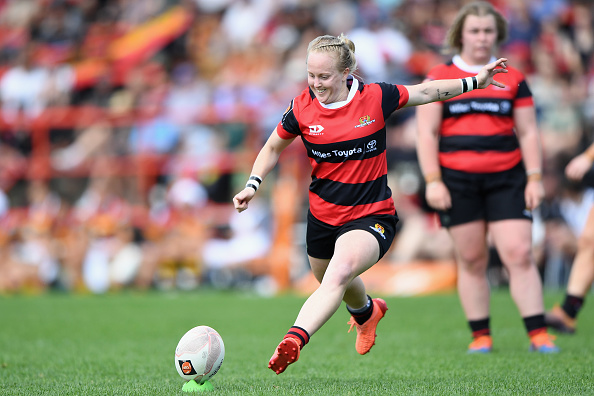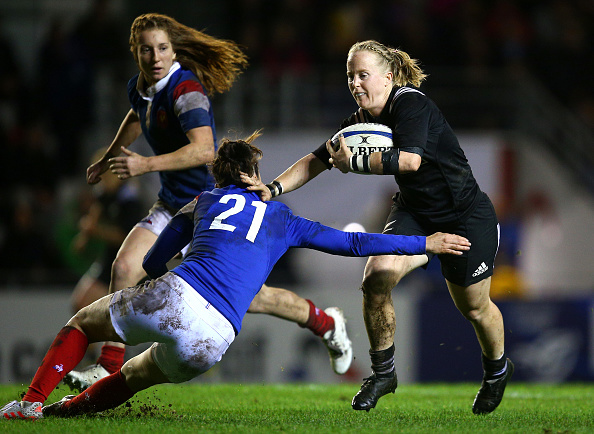
The rescheduled event in New Zealand will likely be Cocksedge's international swansong.
The former World Rugby women's player of the year believed lifting the world cup trophy at Eden Park in November next year would be the perfect sign-off to her 15-year career in the black jersey.
Although she regularly joked with her team mates about when she would hang up her boots - she has made no concrete decisions - however she said the past year had brought her future in the game into focus.
The 32- year-old said she was "gutted" when the world cup was delayed but it had given her plenty of time to contemplate what it would take, mentally and physically, to make it to the showpiece event and that included some tough decisions.
"I think in hindsight now, after a couple of months of the announcement of it being postponed, it has made me sit back and realise that I probably had a bit of mental fatigue hanging around that I wasn't fully aware of," Cocksedge said.
Cocksedge has played rugby for 29 years including years of back-to-back club, provincial and international fixtures.
"I was just going to dig through for the next nine months till the end of world cup, now with the postponement it's given me an opportunity to take a break away from club footy, and it was a hard decision to do that," she said.
"I still need to think about how the next six months look for me individually in terms of making myself fresh coming into a world cup year and unfortunately club rugby had to be the first to go."
Cocksedge had the support of the Black Ferns coaching staff to step away from the grassroots game and take a break but she would be back for Canterbury in the Farah Palmer Cup.
"All athletes go through this and I know some are. [White Ferns captain] Sophie Devine as well as the Silver Ferns captain have been the same so I know they've gone through a bit of that and it's just making those decisions to put yourself first and with how important wellbeing is, you could be the best player in the world but if you're mentally not there then you're not going to be the full package."
Black Ferns coach Glenn Moore said managing player welfare ahead of the world cup was important.
"Someone like Kendra, and there's been others that I've sat down with, and we've spent a number of hours going through looking at what would come up, what sort of loading we'd have by the world cup and actually insuring that they get some time out to refresh," Moore said.
"Then also it's really important that we have a ramp back in time as well, they can't come off doing very little to going straight back into a Test match so we've got to have a real robust plan in and around that which we've done."
Moore said the confirmation of the new dates for the world cup and Test matches in the pipeline for later this year against tier one nations gave the team a timeline to work towards.
"It helps lift the player group as well. It's been very difficult over the last period training to train basically so now we know we're going to train to play," Moore said.

"We're now sitting in a position where we're really disadvantaged because we haven't played any proper Test matches since 2019 and I look at the stats of how many we've played since the last world cup and how many the likes of England have played and I think they're up to around 30.
"So we've had an advantage in some cases in New Zealand that we've had our domestic competitions up and going but now the Northern Hemisphere have got a slight advantage because they've played significant Test matches over the last few months."
Player welfare spurs world cup changes
The new dates for the Rugby World Cup mean the tournament will be extended from 35 to 43 days to give all teams a minimum of five rest days between matches in line with the approach recently approved for the men's competition.
Which is a move that Moore supported.
"The players deserve that level of respect as well," Moore said.
"We often talk in the game, whether it's men's game, women's game, about the players' workload and wellbeing and I think it's very important to help us manage the risk of injuries and I think it will continue to enhance the quality of the matches as well."
Black Ferns captain Eloise Blackwell said at 30-years-old the additional rest and recovery days were welcome for her "old body".
"Previous world cups I've been to I think one game we had a turnaround of three days between a game and I know right back in the days some of the girls backed up games the next day, so it's good to see wellbeing in the wellness of the players is at the front of their mind," Blackwell said.
Kendra Cocksedge agreed that the break between matches was necessary and it might even allow the defending champion Black Ferns to showcase a bit of a different style.
"With the standard of rugby now and the intensity that we're playing at I think it's important that we have that bit of extra time between games to be able to recover right so that we can put our best foot forward going into the next game."












